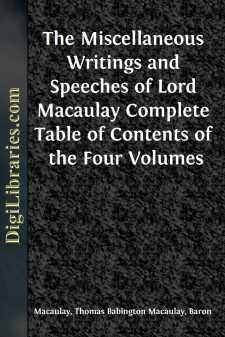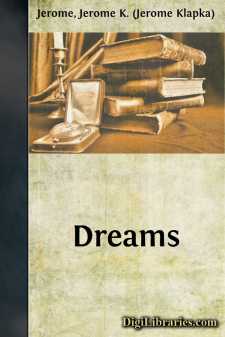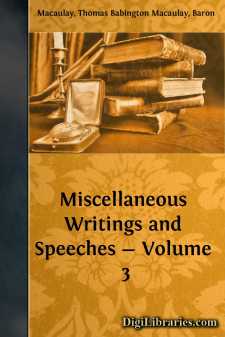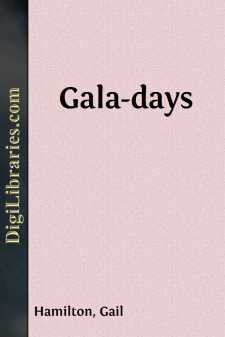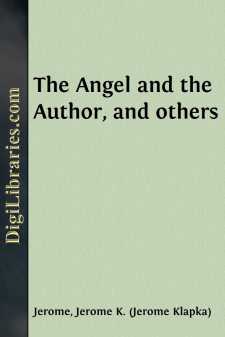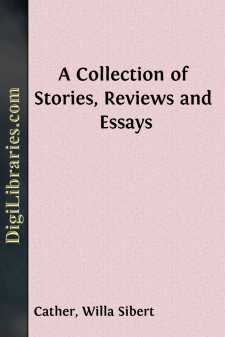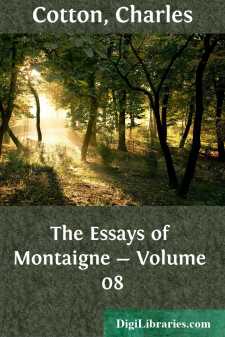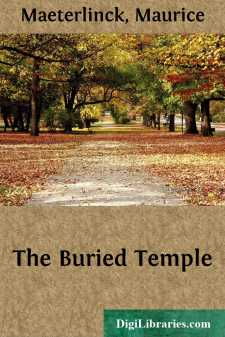Literary Collections
- American 84
- Ancient, Classical & Medieval 14
- Asian 1
- Australian & Oceanian 1
- Canadian 55
- Continental European 121
- English, Irish, Scottish, Welsh 179
- Essays
- General 24
- Letters 46
- Middle Eastern 1
Essays Books
Sort by:
PREFACE. Lord Macaulay always looked forward to a publication of his miscellaneous works, either by himself or by those who should represent him after his death. And latterly he expressly reserved, whenever the arrangements as to copyright made it necessary, the right of such publication. The collection which is now published comprehends some of the earliest and some of the latest works which he...
more...
The most extraordinary dream I ever had was one in which I fancied that, as I was going into a theater, the cloak-room attendant stopped me in the lobby and insisted on my leaving my legs behind me. I was not surprised; indeed, my acquaintanceship with theater harpies would prevent my feeling any surprise at such a demand, even in my waking moments; but I was, I must honestly confess, considerably...
more...
FRANCIS ATTERBURY. (December 1853.) Francis Atterbury, a man who holds a conspicuous place in the political, ecclesiastical, and literary history of England, was born in the year 1662, at Middleton in Buckinghamshire, a parish of which his father was rector. Francis was educated at Westminster School, and carried thence to Christchurch a stock of learning which, though really scanty, he through life...
more...
by:
Gail Hamilton
PART I Once there was a great noise in our house,—a thumping and battering and grating. It was my own self dragging my big trunk down from the garret. I did it myself because I wanted it done. If I had said, "Halicarnassus, will you fetch my trunk down?" he would have asked me what trunk? and what did I want of it? and would not the other one be better? and couldn't I wait till after...
more...
CHAPTER I I had a vexing dream one night, not long ago: it was about a fortnight after Christmas. I dreamt I flew out of the window in my nightshirt. I went up and up. I was glad that I was going up. “They have been noticing me,” I thought to myself. “If anything, I have been a bit too good. A little less virtue and I might have lived longer. But one cannot have everything.” The...
more...
Peter “No, Antone, I have told thee many times, no, thou shalt not sell it until I am gone.” “But I need money; what good is that old fiddle to thee? The very crows laugh at thee when thou art trying to play. Thy hand trembles so thou canst scarce hold the bow. Thou shalt go with me to the Blue to cut wood to-morrow. See to it thou art up early.” “What, on the Sabbath, Antone, when it is so...
more...
by:
Charles Cotton
OF WAR HORSES, OR DESTRIERS I here have become a grammarian, I who never learned any language but by rote, and who do not yet know adjective, conjunction, or ablative. I think I have read that the Romans had a sort of horses by them called 'funales' or 'dextrarios', which were either led horses, or horses laid on at several stages to be taken fresh upon occasion, and thence it is...
more...
THE MYSTERY OF JUSTICE 1 I speak, for those who do not believe in the existence of a unique, all-powerful, infallible Judge, for ever intent on our thoughts, our feelings and actions, maintaining justice in this world and completing it in the next. And if there be no Judge, what justice is there? None other than that which men have made for themselves by their laws and tribunals, as also in the social...
more...
Here, if I cut my coat according to my cloth, t should have a garment which this whole volume would hardly stuff out with its form; and I have a fancy that if I begin by answering, as I have sometimes rather too succinctly done, that we have no more a single literary centre than Italy or than Germany has (or had before their unification), I shall not be taken at my word. I shall be right, all the same,...
more...
by:
Richard King
FOREWORD BY SIR ARTHUR PEARSON, BART., G.B.E. Those who buy "Over the Fireside" will purchase for themselves the real joy of mentally absorbing the delightful thoughts which Mr. Richard King so charmingly clothes in words. And they will purchase, too, a large share of an even greater pleasure—the pleasure of giving pleasure to others—for the author tells me that he has arranged to give half...
more...


